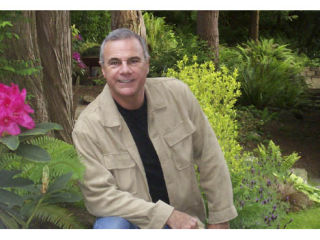Then, author Anthony Flacco can help you write that book.
Having been an actor, screenwriter, novelist, true crime writer, ghostwriter and teacher, Bainbridge writer Anthony Flacco has a veteran’s perspective on getting a book done. One of the keys: invest your ego in the work, not yourself.
“You can’t sit down to write a bestseller,” he said. “It’s just like an actor who decides to go into acting to win an Oscar. You have to sit down to write a book that speaks to you as a writer.”
Flacco’s upcoming spate of published work, soon-to-be-published work, and appearances – including a presentation of his latest novel, “The Hidden Man,” on Thursday evening at Eagle Harbor Book Co. – offers a strong indicator to his own approach to being a writer. Arbitrarily sticking to a genre isn’t so important; telling a memorable story through compelling characters is. And there are all sorts of formats through which a writer can meet that goal.
Take true crime, for example. Flacco’s first non-fiction book, “A Checklist for Murder,” came only after he’d written an unpublished novel. A lawyer he knew took a look at the draft and asked Flacco if he’d ever heard of the Peernock murder case. Maybe he’d be interested in writing about that.
Flacco had thought he’d make a career writing historical fiction. The Peernock detour led to a published book and follow-up television script.
Subsequent published efforts included “Tiny Dancer,” the story of a young Afghan burn victim; “The Last Nightingale,” the precursor to “The Hidden Man”; and numerous editorial and ghostwriting credits. Forthcoming are “Sanford Clark and the True Story of the Wineville murders” – one of whose characters was the real-life inspiration for the recent Clint Eastwood film, “The Changeling,” – and a guidebook he’s co-authoring with his partner, literary agent Sharlene Martin, on getting non-fiction published in the 21st century.
The forthcoming guide was inspired by what the two call the “crazy queries” article they wrote for Writer’s Digest, which featured a series of hilarious but real letters Martin had received from would-be authors. The magazine publishers liked the article so much they contacted the pair about a full book on how to navigate the rough waters of publishing.
“Because when you watch people make these mistakes again and again, year after year, it’s hard not to want to jump in,” Flacco said.
That idea forms the backbone of the University of Washington Extension class Flacco will lead this winter, “Popular Fiction Creative Workshop for Experienced Writers.”
It will offer a specific set of tools to help writers produce a finished set of chapters and understand how to go about selling them. There will be no literary theory, no theses on the canon, but instead, a practical roadmap to being smart and workmanlike about writing the book, and then strategic about selling it.
(Flacco once got onto an agent’s radar by putting graphic crime scene photos at the top of a manuscript submission.)
There’s also his mantra: “’Actually do the work.’ I repeat it over and over,” he said.
Perhaps the most important skill Flacco wants to send students away with is the ability to critique other people’s work without criticizing, and in so doing, learn how to critique their own work more gently. As our own harshest critics, we can kill our spirits and sabotage our efforts as thoroughly as a mean-spirited rejection letter.
Many writing classes do nothing to assuage that angst – just the opposite, by leading off with a cataloguing of how many odds are stacked against every writer and a litany of reasons why every attendee is destined to fail. When Flacco himself encounters that type of course, he walks out. He’d rather teach someone how they can, not how they can’t.
“Somebody’s doing it, and how are you going to do it? Let’s talk about that,” he said.



